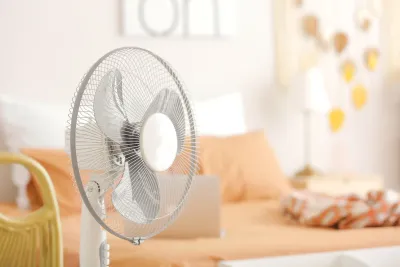Which Side Should You Sleep On? Left or Right and How to Do It
Chilipad Editorial Team • Aug 14, 2025

Key Takeaways
For most people, sleeping on the left side is often recommended because it may support digestion and circulation, while the best side ultimately depends on comfort, health conditions, and personal sleep needs.
- Sleeping on your side helps keep the spine aligned, which may reduce back pain and morning stiffness.
- Left-side sleeping is often recommended for digestion and may help reduce acid reflux and heartburn.
- Side sleeping has been linked to brain health by supporting the body’s natural waste-clearing processes during sleep.
- Poor alignment while side sleeping can strain the neck and shoulders, making pillow choice and positioning important.
- For many people—including pregnant individuals—the left side is generally considered the most supportive sleep position.
Your sleep position says more about your health than you might think. Among the various positions, side sleeping is one of the most common and is often recommended by health professionals.
Below, we'll explain the health benefits and drawbacks of side-sleeping, helping you determine which side is best for you and how to optimize your sleep position.
Did You Know: A recent study found that participants, on average, spent 54% of the time sleeping on their side. [1]
Cool Comfort, No Matter Your Sleep Side
Whether you sleep on your left or right side, stay cool and comfortable all night long with the Chilipad—personalized temperature control, no matter your sleep position.
Which is the Best Side to Sleep On?
If you're a side sleeper, consider sleeping on your left side. Sleeping on your left side has plenty of health benefits compared to sleeping on your right side.
For example, people who experience heartburn can find that sleeping on their left side can offer significant relief. It helps reduce acid reflux symptoms, supports lymphatic drainage, and even aids digestion during sleep. [2] It can also enhance circulation and allow the brain to filter out waste, due to the way internal organs are positioned in the human body.
That said, it's important to note that sleeping in a non-fetal position on your left side is critical to reaping these benefits.
Is Sleeping on Your Left Side Better?
When it comes to sleep positions, the left side often takes the crown—and for good reason. This position is generally considered the most beneficial for overall health, especially when it comes to digestion and circulation.
Sleeping on your left side can help reduce acid reflux by keeping the junction between your stomach and esophagus above the level of gastric acid. It also supports better heart function by easing pressure on the vena cava, a major vein that returns blood to the heart.
This makes it especially ideal for people with acid reflux or cardiovascular concerns.
Benefits of Left Side Sleepers
- Reduces Acid Reflux: Gravity works in your favor—sleeping on your left side can help keep stomach acid down and digestion running smoothly.
- Boosts Circulation: This position can ease pressure on the vena cava, helping blood flow more freely back to the heart, which is especially helpful for women during pregnancy.
- Supports Lymphatic Drainage: The body’s lymph system drains more efficiently on the left side, potentially aiding in toxin removal while you sleep.
- May Improve Heart Health: Less pressure on the heart itself means your cardiovascular system can function more comfortably overnight.
- Pregnancy-friendly: Left-side sleeping is widely recommended for expecting mothers—it promotes better blood flow to the uterus, kidneys, and fetus.
- Helps Relieve Back Pressure: Pairing left-side sleeping with a pillow between the knees can align the spine and reduce strain on the lower back.

Is Sleeping on Your Right Side Better?
Sleeping on your right side has its upsides, like potentially lowering pressure on internal organs like the heart, which can feel more comfortable for some people, especially those with certain cardiovascular concerns. It may also help reduce snoring for back-sleepers transitioning to side sleeping.
However, the right side might not be your best bet for individuals with acid reflux or GERD (gastroesophageal reflux disease). Lying on this side can relax the lower esophageal sphincter, allowing stomach acid to travel back into the esophagus more easily, cueing the dreaded heartburn.
For example, if you tend to reach for antacids after pizza night, sleeping on your right side could make those symptoms worse. Sleeping on the left side, on the other hand, may help keep acid where it belongs—down in your stomach.
Right-side sleeping can work well for some, but if reflux is part of your nightly struggle, a shift to the left might offer some relief.
Did You Know: Your sleeping side preference can do more than boost comfort—it can affect digestion, heart health, and snoring. Turns out, your body’s favorite side has its perks.
Benefits of Right Side Sleepers
- May Ease Heart Pressure: Right-side sleeping can reduce the weight your heart has to pump against, which may feel more comfortable for some individuals with cardiovascular concerns.
- Can Help with Snoring: Switching from back to right-side sleeping may open up airways and reduce snoring, especially in mild cases of sleep apnea.
- Supports Lymphatic Drainage on the Left: Since the body’s lymphatic system predominantly drains on the left, sleeping on your right side may promote more efficient fluid movement.
- Comfort for Certain Digestive Conditions: While left-side sleeping is generally better for acid reflux, some people with specific gastrointestinal issues may find relief on the right side.
Which is the Best Side to Sleep On?
Which position will help with your current health? Below, we’ve included various positions that can help with the following.
Best Sleep Positions For Back Pain
Back pain can result from various symptoms or injuries, and there are ways to treat it. While there isn't much research linking back pain to sleeping habits or positions, experts believe those with back pain more commonly suffer from sleep deprivation than those without back pain. [3]
You can use an extra bed pillow if you can't sleep at night. You can find specific body pillows for back sleepers online. If you prefer to sleep on your left or right side, commonly known as "side sleepers," and suffer from back pain, experts suggest sleeping with a thin pillow between your legs. If you commonly find yourself sleeping on your stomach, place a pillow under your pelvis, and if you sleep on your back, place a small pillow under your knees.
Each position helps to alleviate pressure and stress on your back and helps encourage its natural curve. Please consult your doctor for additional questions about possible positions that relieve back pain.

Overall Benefits of Sleeping on Your Side
Curious why so many people sleep on their side? It turns out, this position offers a surprising array of health and comfort perks, including:
Spinal Alignment
Side sleeping is a top-tier hack for spinal alignment. [4] When you’re properly positioned, it helps keep your spine in a neutral, supported posture, relieving pressure points and dialing down back pain.
Add a pillow between your knees, and you’re not just leveling up comfort, you’re optimizing hip and knee alignment too. It's posture perfection, even while you sleep.
Back Pain Relief
Side sleeping isn’t just comfortable, it’s a smart way to align your spine and ease back pain. With the right pillow and mattress support, it reduces pressure on your lower back and keeps your spine straight, eliminating weird twists and strains.
Whether you're dealing with sciatica, herniated discs, or just that familiar “why-does-this-hurt-now” lower back ache, side sleeping, with the right setup, might just be the nightly patch your back’s been waiting for.
Digestive Boost
Sleeping on the left isn’t just a comfort; it can help your digestive system run smoother. Gravity works in your favor here, helping keep stomach acid where it belongs and reducing the chances of heartburn or acid reflux.
It also encourages better food movement through the digestive tract, which is why many people with GERD or digestive issues swear by it. Simple switch, real relief.
Brain Health
Side sleeping might give your brain a serious boost. Research suggests this position helps your glymphatic system, a kind of nightly housekeeping crew, clear out waste and toxins more efficiently. This cleanup process is key for brain health and may even reduce the risk of neurodegenerative diseases like Alzheimer’s.
Sleep Apnea Relief
If you deal with obstructive sleep apnea (OSA), [5] side sleeping could be a game-changer. Lying on your side helps keep your airway open by preventing the tongue and soft tissues from collapsing back into the throat, one of the main culprits behind snoring and interrupted breathing.
This sleep position reduces those gasping wake-ups and leads to more consistent, restful sleep. Over time, better sleep means better energy, focus, and heart health.
Positive Impact: Sleeping on your side helps you breathe easier and sleep deeper.
Pregnancy Benefits
For moms-to-be, especially in the second and third trimesters, left-side sleeping isn’t just a comfort tip, it’s a legit health hack. This position boosts blood flow to the heart, uterus, kidneys, and baby, while also easing pressure on the liver.
It can help reduce swelling, improve nutrient delivery, and promote better oxygen flow—all key for a healthier pregnancy.
Reduce Heartburn
If acid reflux keeps crashing your sleep party, side sleeping—specifically on your left side, might be the fix. This position uses gravity to help keep stomach acid from creeping up into the esophagus, reducing that burning sensation that can wreck your night. It’s especially helpful for people with GERD or frequent heartburn flare-ups.
Who Should Avoid Side Sleeping?
While side sleeping has it's benefits, there are drawbacks of sleeping on your side
Shoulder and Neck Pain
Side sleeping has its perks—but only if your alignment is on point. Without the right support, your shoulder can take on too much pressure, and your neck may end up at an awkward angle.
- Shoulder Pain: Favoring one side night after night or tucking your arm under your head can strain your shoulder and leave you sore by morning.
- Neck Discomfort: A pillow that’s too flat (or too puffy) can throw off your neck’s alignment, leading to stiffness or aches.
Potential for Discomfort
While sleeping on your side has become popular, it isn’t always pain-free. Lying on the same side for too long can put extra pressure on your shoulder or hip, leading to soreness or discomfort, especially if your mattress is too firm or lacks proper cushioning.
Supportive pillows between the knees and one for your head can help ease the pressure. Still feeling achy? Switching sides or adjusting your position throughout the night can help prevent pain from settling in.
Not Ideal for Everyone
Sleeping on your side, while comfy for many, might not be the best fit for everyone. If you’re dealing with chronic shoulder pain, hip discomfort, or certain spinal conditions, this position could actually make things worse. Pressure points can flare up, and spinal alignment can be tricky without the right support.
Jaw Pain
Catching sleep on your side might feel cozy, but it can put added pressure on your jaw, especially if your head isn't properly supported or you have a habit of clenching in your sleep. This extra stress on the temporomandibular joint (TMJ) can lead to morning jaw soreness, tension headaches, or even difficulty chewing.
Numbness and Tingling
Favoring one side while you sleep can sometimes compress nerves or restrict blood flow, leading to that all-too-familiar pins-and-needles sensation in your arms or legs. If you wake up feeling like a limb’s gone offline, your sleep position could be the culprit.
A supportive mattress and smart pillow placement can help take the pressure off and keep circulation flowing freely through the night.
Poor Circulation
Curling up on your side with bent knees might feel cozy, but it can compress blood vessels in your legs, slowing down circulation and leaving you feeling stiff or tingly come morning. If you’re waking up with heavy legs or numb toes, try stretching out a bit more or placing a pillow between your knees to ease the pressure and keep blood flow moving smoothly while you sleep.
Tips for Side Sleeping
If you are not currently a side sleeper but want to give it a try, here are some helpful tips to make the transition smoother:
- Use Extra Pillows: Surround yourself with pillows to create a comfortable sleeping environment. A body pillow can provide support and help maintain your position throughout the night.
- Gradual Transition: Start by consciously trying to fall asleep on your side. You may find it helpful to begin with short naps on your side before transitioning to full nights of sleep.
- Adjust Your Mattress: Make sure you have a supportive mattress that accommodates side sleeping. A medium-firm mattress is often recommended for optimal support and comfort.
- Neck Support: Invest in a quality pillow that supports your neck and keeps your head aligned with your spine. A memory foam pillow can be particularly helpful for side sleepers.
- Create a Comfortable Environment: Make your sleeping area as comfortable as possible. This includes maintaining a cool sleep temperature, using blackout curtains, and minimizing noise.
- Avoid Stomach Sleeping: If you tend to sleep on your stomach, consider using a small object, like a tennis ball, attached to your sleepwear. This can discourage rolling onto your stomach during the night.
- Establish a Bedtime Routine: Create a calming bedtime routine to help signal to your body that it’s time to sleep. This can include activities such as reading, meditating, or practicing gentle stretches.
- Be Patient: Adjusting to a new sleeping position takes time. Be patient with yourself and give your body time to adapt to side sleeping.
There are a variety of sleep styles out there; to determine your sleep style personality, we've explored the various sleeping position names with a brief description to help you understand it better.
Final Thought
Sleeping on the left or right side can come with plenty of perks—if you do it right. With the right one (whether standard or a foam mattress) and pillow setup, side-sleeping helps maintain alignment and reduce discomfort.
Whether you’re team left or team right, knowing the pros and cons of each side can help you make smarter choices for better sleep and long-term health.
Side Sleeping Frequently Asked Questions
Is sleeping on your left side better than your right?
For many people, sleeping on the left side can help with digestion and reduce acid reflux. That said, the best side is the one that feels comfortable and supports your body without causing pain.
Is side sleeping good for everyone?
Side sleeping works well for many people, but it may not be ideal for everyone. Individual comfort, pain levels, and health conditions play a role in determining the best sleep position.
How Do I Train Myself To Sleep On My Side?
Use a body pillow for support and place a pillow behind your back to prevent rolling. Try the tennis ball trick, taped to your shirt, it keeps you from rolling over. Start every night on your side, and stay consistent. Your body will catch on.
How To Switch From Stomach To Side Sleeping?
Start by using a body pillow to hug and align your spine. Place a firm pillow between your knees for hip support. To break the stomach-sleeping habit, block yourself with a pillow or try the tennis ball-in-the-shirt trick. Stick with it—your body will adapt faster than you think.
Which Side Should You Sleep On for Digestion?
If digestion is the name of the game, the left side is your MVP. Sleeping on your left side supports better digestive flow thanks to the natural layout of your organs. Your stomach and pancreas sit on the left, and gravity lends a hand in helping food waste move more efficiently into the large intestine.
Bonus perks of left-side sleeping:
- May ease heartburn and acid reflux
- Can improve lymph drainage
- Supports healthy bowel movements
Peer-Reviewed Research References
-
Skarpsno, E.S., et al.
Sleep Positions and Nocturnal Body Movements Based on Free-Living Accelerometer Recordings.
Nature and Science of Sleep, 2017.
Study Type: Observational Population Study
Key Finding: Found that sleep position and nighttime movement patterns vary by age, sex, lifestyle factors, and insomnia symptoms, highlighting the role of habitual sleep posture in sleep quality.
View Study
Source URL: https://www.dovepress.com/sleep-positions-and-nocturnal-body-movements-based-on-free-living-acce-peer-reviewed-fulltext-article-NSS
-
Katz, L.C., Just, R., Castell, D.O.
Body Position Affects Recumbent Postprandial Reflux.
Journal of Clinical Gastroenterology, 1994.
Study Type: Clinical Physiological Study
Key Finding: Demonstrated that body position significantly influences post-meal acid reflux during recumbency, with certain sleep positions reducing esophageal acid exposure and reflux symptoms.
View Study
Source URL: https://pubmed.ncbi.nlm.nih.gov/8071510/
-
Levine, B.
Sleep Better When You Have Chronic Pain.
Everyday Health, 2017.
Source Type: Health Journalism with Medical Review
Key Insight: Provides practical, clinician-informed guidance on sleep positioning, pain management strategies, and bedtime routines to improve sleep quality in individuals with chronic pain.
View Resource
Source URL: https://www.everydayhealth.com/pain-management/how-sleep-when-you-ache/
-
Ravesloot, M.J., van Maanen, J.P., Dun, L., de Vries, N.
The Undervalued Potential of Positional Therapy in Position-Dependent Snoring and Obstructive Sleep Apnea: A Review of the Literature.
Sleep & Breathing, 2013.
Study Type: Literature Review
Key Finding: Reviews evidence showing that positional therapy can significantly reduce snoring and obstructive sleep apnea severity in individuals whose symptoms are position-dependent, particularly when avoiding the supine sleeping position.
View Study
Source URL: https://link.springer.com/article/10.1007/s11325-012-0683-5
-
Mayo Clinic.
Obstructive Sleep Apnea – Symptoms and Causes.
Mayo Clinic, 2023.
Source Type: Academic Medical Guidance
Key Insight: Explains the causes, risk factors, and symptoms of obstructive sleep apnea, including the role of sleep position in airway collapse during sleep.
View Resource
Source URL: https://www.mayoclinic.org/diseases-conditions/obstructive-sleep-apnea/symptoms-causes/syc-20352090









